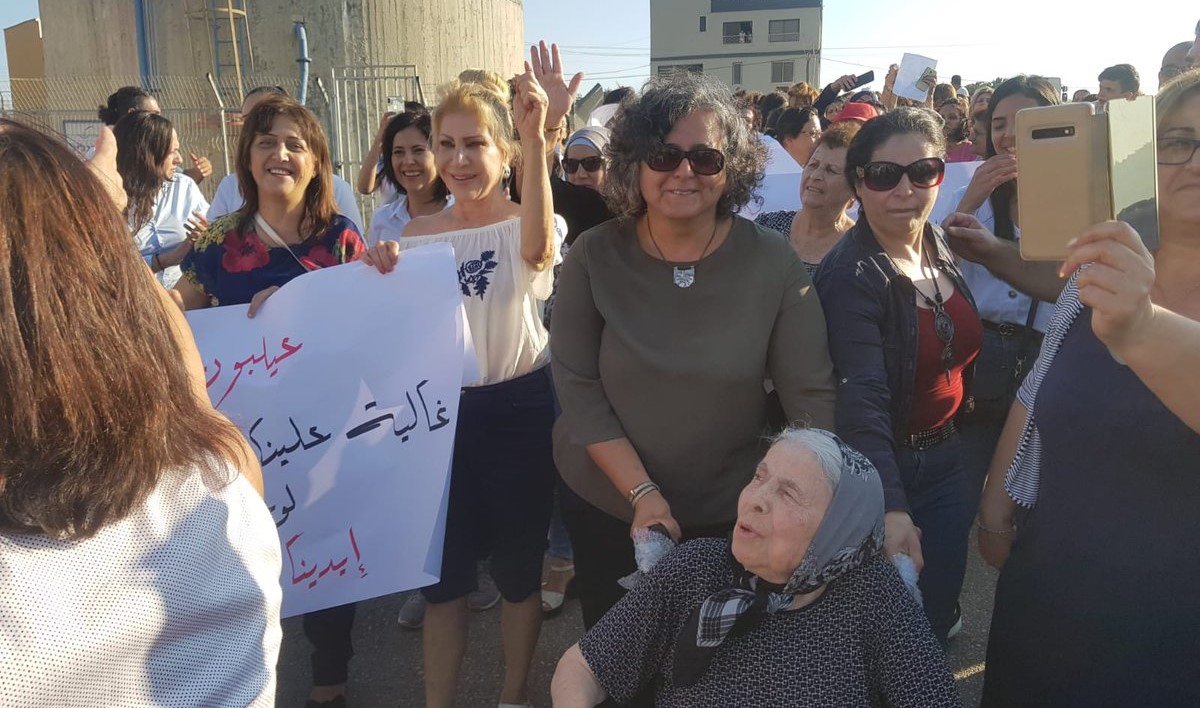The 13 members of the Knesset elected from the Joint List boycotted the inaugural swearing in of MKs to the 22nd Knesset held yesterday (Thursday, October 3) in Jerusalem. The lawmakers’ boycott came as part of Thursday’s general strike called for by the High Follow-Up Committee for Arab Citizens of Israel’s. Joint List leader MK Ayman Odeh (Hadash) said: “Dozens of people murdered since the beginning of this year are not just victims of violent crime; they are victims of the apathy of the government and law enforcement authorities.” “It is not acceptable that we continue burying our children while the rest of the MKs take celebratory photos in the plenum,” Odeh added. “We will join our constituents in demonstrations across the country.”

Women from the northern town of Eilabun protest against violence in their community and against police inaction, Monday, September 30, 2019. In the center is Hadash MK Aida Touma-Sliman, a resident of Akka. (Photo: Zu Haderech)
Hadash MK Youssef Jabareen said Joint List MKs will take a leading role in the High Follow-Up Committee’s protests. “We cannot go back to our routine when the blood continues to be spilled in Arab towns without the police and law enforcement authorities lifting a finger. We have reached our limit,” Jabareen said. The total number of Arab citizens of Israel who have been murdered so far this year is 72. Protests against violence in the Arab community – and the police’s perceived failure to help – were held continuously from last Friday to Thursday.
A mass meeting was held yesterday in Majd al-Krum with the participation of all Joint List MKs’. On Tuesday, October 1, two brothers were killed and two other men were injured in a brawl involving shooting and knifing in that Arab town in northern Israel. The first victim was 36-year-old Ahmed Manaa, who was rushed to a Nahariya hospital in critical condition with a gunshot wound where he died of his injuries. His brother Halil Manaa, 23, was taken to the hospital in serious condition from a gunshot wound and was operated on but later died as well.
Schoolchildren and teachers went on strike during three days in Umm al-Fahm, and, joined by thousands of people, marched through the city to the city’s main police station, holding aloft signs urging people to speak out, and calling on police to seize illegal weapons.
Another protest was held in Tuesday, in the northern town of Eilabun, organized by local women and brought hundreds of people to the streets. Hadash MKs Ayman Odeh, Aida Touma-Sliman and Jaber Asakly participated in the demonstration. “Violence in Arab society is a horrific plague,” Joint List chair Odeh said of the protest in Eilabun, “and today’s demonstration is a symbol of an inspiring civil struggle.” “Arab citizens are standing up to condemn the violence, but it is the Israeli police’s role to cut it off at the source,” the Hadash leader added. “This will happen when the body, which has been entrusted with public safety, treats us as equal citizens and not as enemies”.
The protest in Umm al-Fahm began over the weekend after a resident was shot dead, ten days after another resident was killed in similar circumstances in a nearby town. Hundreds protested on Friday in northern Israel, blocking the Wadi Ara road, over police inaction on gun violence in the Arab society. The action comes as a young man, Ibrahim Mahameed, 25, was shot and killed in Umm al-Fahm.
In addition, pupils in Umm al-Fahm go on strike on Sunday in an effort to highlight the increasing levels of violence and crime rocking the Arab-Palestinian community in Israel. MK Jabareen, a resident of Umm al-Fahm, said: “This alarming situation of continued internal violence in our community has become a troubling, daily reality for the Arab citizens, depriving them of sleep at night, eliminating any sense of personal security, and becoming a recurrent event as days go by because of increasing number of firearms, shootings, murders, and crime raging in the streets.”
The number of victims of such crimes, Jabareen said, “lead the Arab citizens to a sense of helplessness mixed with a sense of lawlessness, inaction, and lack of effective response by governmental authorities to protect the most basic human right – life!… The Israel State Comptroller’s report and the daily reality show that police forces repeatedly fail to protect the Arab citizens,” concluded Jabareen.
Related:
- Hundreds Protest Police Inaction vs. Gun Violence in Arab Society
- Four Shot Dead within Hours as Gun Violence Spikes in Arab Towns
- Six Citizens from Arab Community Murdered since Beginning of 2019
- 4 Dead in 3 Separate Shootings in the Arab Sector; MK Jabareen Blames Government for Inaction
- Gov’t Cuts NIS 400M from Plan to Tackle Violence in the Arab Sector
- MK Odeh: Erdan Is Handing Out Guns while Arab Society Bleeds
- Knesset Cancels Debate on Crime Enforcement in Arab Communities
- Convoy to Jrsl’m to Protest Apathy towards Violence in Arab Society


